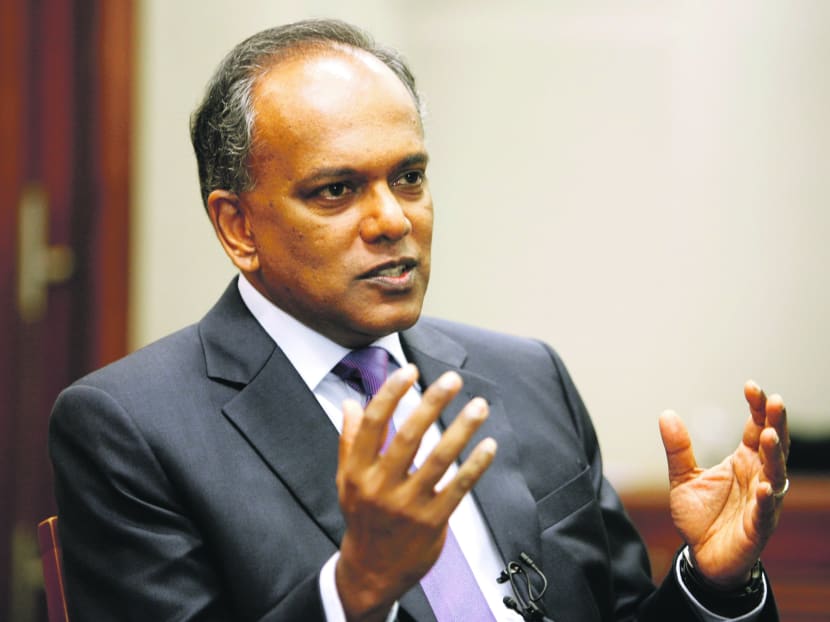Singapore does not comment on intelligence matters: Shanmugam
SINGAPORE — The Republic does not comment on intelligence matters even if allegations are untrue, and “the Indonesians and Malaysians know we won’t do anything to harm relations”, Law and Foreign Affairs Minister K Shanmugam said yesterday.
SINGAPORE — The Republic does not comment on intelligence matters even if allegations are untrue, and “the Indonesians and Malaysians know we won’t do anything to harm relations”, Law and Foreign Affairs Minister K Shanmugam said yesterday.
Giving the Government’s first official response to allegations made in the Sydney Morning Herald earlier this week that Singapore’s intelligence arm was working with Western nations to spy on Indonesia and Malaysia, Mr Shanmugam said the report “was essentially a rehash of an article that appeared in August”.
“But this time round, the writer took a leave of licence and liberty of mentioning Singapore, in rather tenuous circumstances,” he added.
Speaking at The Straits Times Global Outlook Forum, Mr Shanmugam pointed out that the most recent article was published as the rift between Indonesia and Australia widened over allegations that Australian intelligence had tapped the phones of Indonesian President Susilo Bambang Yudhoyono, his wife and top officials.
“Just as the relationship between Indonesia and Australia got to an interesting stage, this article gets printed and now, gratuitously, Singapore gets mentioned,” Mr Shanmugam said.
“Even when the allegations are untrue, we never come out and deny them. Because you cannot be (on intelligence matters) coming out and saying this is true, this is untrue, or this is 5 per cent true, that is 95 per cent false. (For example saying) ‘Yes, we work with the Americans, the Australians, the Indonesians and the Malaysians on this aspect of counterterrorism and, therefore, this line in your article is true because it says we do.’ This sort of thing never ends.”
Mr Shanmugam added: “The point is, the Indonesians and Malaysians know we won’t do anything to harm relations. And our position is: When you talk about intelligence, we don’t come out and confirm or deny.”
During the broad-ranging 90-minute forum, Mr Shanmugam also addressed tensions over China’s recently announced Air Defence Identification Zone over disputed islands in the East China Sea.
China last week unilaterally announced that all foreign aircraft passing through the area would have to identify themselves to China. The United States sent two unarmed B-52 bombers through the airspace earlier this week, with China, Japan and South Korea following suit in sending their military aircraft into the disputed airspace.
Ties between China and Japan have been strained for months by the dispute over the islands in the South China Sea, called the Diaoyu by China and the Senkaku by Japan. The islands are currently under Japanese administrative control.
Beyond the specific acts of one country, Mr Shanmugam said he would prefer to look at “the entire suite of developments” in the region. “The underlying trends I think really are that each of these countries are, to some extent, impelled (or) propelled by nationalism,” Mr Shanmugam said.
Mr Shanmugam noted that no leader in China, Japan, the US and South Korea could be seen to be giving up territorial sovereignty, and thus “have to show to their public that they are protecting their sovereignty”.
“I think there is a serious risk of miscalculation. Some ship captain gets a rush of blood (and) does something, then action and reaction could quickly escalate,” he said.
As “a significant trading nation in the world,” Mr Shanmugam said Singapore’s position has always been to advocate the need to keep global commerce free through the Association of Southeast Asian Nations (ASEAN), and work on multilateral platforms such as the ASEAN Regional Forum and the East Asia Summit.
“Our interests are very clear, we are a major air hub in South-east Asia; we are a major seaport, one of the world’s great seaports. The ability, freedom of navigation, freedom of air rights — these are fundamental to us and our interests.”
While ASEAN has various forums for countries to engage in dialogue, Mr Shanmugam had a word of caution. “We also must not kid ourselves. What are perceived as fundamental national sovereignty issues, they are not always going to be dealt with at these sorts of multilateral forums,” he said.
“Many of these issues are capable of being set aside or dealt with, but the pressures of nationalism may nevertheless push countries into positions which, looking on as an outsider, we may think are not very logical.”







